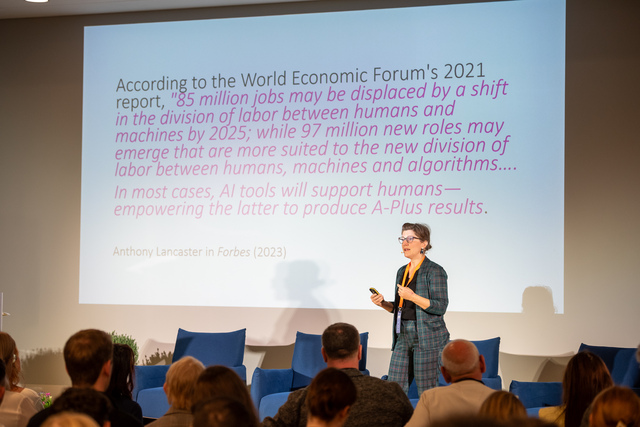

 All news
All news

Mari-Klara Stein is a professor of management at the department of Business Administration in TalTech and a visiting lecturer at the department of Digitalization at Copenhagen Business School. Dr Stein earned her doctorate at Bentley University (USA). Her research focuses on the digital transformation of work, including emerging forms of digital work, such as platform work and crowd work; implications of work digitalization on emotional well-being and work meaningfulness, and the consequences of datafication and algorithmic management in the workplace.
In her presentation “Human-AI Collaboration: “Bot-ification” and Beyond”, Dr Stein argued about the idea of humans and AI cooperating in the future. She started by introducing a couple of quotes that describe the views regarding this cooperation. The quotes, overall, sweepingly stated that AI would not replace humans but humans with AI would be replacing those without it. Coming from here, the presenter stated, it’s reported that such a collaboration would mostly have a positive effect. Henceforth, the speaker introduced three scenarios where AI is and will be an assistant to humans in order to create A-plus results.
Firstly, the classical delegation scenario where we would expect that humans delegate tasks to the AI. Recent research, however, has shown that it is beneficial for AI to delegate tasks to humans not vice versa, because humans are not good at delegating. Yet, AI delegating to humans creates another problem, namely the role-conflict, as humans are not used to being in the position of role-takers while a machine is the role-sender. This results in reduced job performance and job satisfaction – no “A-plus results”.
Secondly, the augmentation scenario where advice from AI could possibly enhance the result of a task performed by a human. One example given is large companies using AI to screen through hundreds of CVs in order to save the time of HR employees. Here, Dr Stein said, the practice has shown that over time the HR managers start mimicking the AI’s decisions (becoming somewhat similar to a bot) and lose the ability to improve upon the mechanistic decision making. Another, more positive, example was brought from policing. In this case AI is used to give suggestions that the police are supposed to take into account while planning their patrolling routes. A “knowledge-broker” gathers the AI suggestions and translates them into a patrolling map for the police. Once this scenario has had time to be worked through, it might be one to produce ”the A-plus results”.
Thirdly, the ensemble scenario where humans and AI are performing the same task in parallel and the result will be aggregated. Here a medical diagnosis example was brought. After the parallel process the patient would get a diagnosis that initially has a built-in second opinion. However, here humans must not forget to hone their skills and keep learning so that the system would not become better than the physicians. Humans should adhere to the point that we keep on practising what makes us uniquely human, because we cannot be good at something if we do not put in the work, the speaker accentuates.
To summarise, the speaker stated that what was discussed here is more about how cooperating with AI should look like, not how machines will replace humans. As could be seen from the examples, some of the results would be less than the sum of both parties, and some would be more than both parties separately - the last ones being those that could produce the previously mentioned A-plus results. To close the topic, the speaker argued that our intuition and physical bodies are not the weaknesses we create them to be, but will always be the advantages while competing with AI.
You can find full discussion on our Youtube channel. More information at conference homepage


 Student
Student